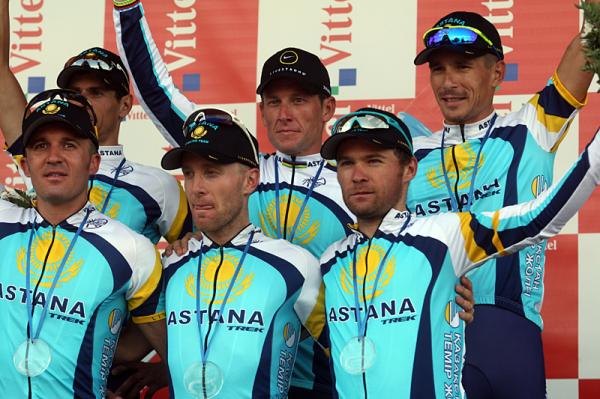UCI denies preferential treatment on testing towards Astana
Governing body defends testing procedures from AFLD attack

The UCI has said that it is "confident that there was no preferential treatment given to any team during the Tour." The denial comes on the back of a story in Monday’s editions of French dailies Le Monde and Le Figaro alleging that the Astana team had benefited from preferential treatment on drug testing during this year’s Tour de France.
According to the French newspapers, the French anti-doping agency (AFLD) has concluded in a 10-page report that Astana "were always the last to be tested in the morning, that there were delays in presenting themselves to the tester" and that details of the team’s location prior to the Tour was not given to the AFLD doctors along with those of every other team.
The AFLD report was sent this morning to the UCI, the World Anti-Doping Agency, the French ministers of health and of sport, and to Tour organisers ASO. It had been put together based on the evidence provided by two AFLD-appointed doctors tasked with the job of carrying out blood and urine tests during the Tour under the aegis of the UCI, which regained control of testing from the AFLD at this year’s race.
The report talked specifically about testing that took place on the morning of July 11. According to Le Monde and Le Figaro, the report said that testing was delayed by 45 minutes as a result of an intervention by UCI inspectors. In addition, it alleges that AFLD escorts were not permitted to attend the process to ensure that riders were not able to manipulate blood levels in between receiving notification of testing and the testing actually taking place.
"Such tolerance, granted without proper justification, in the absence of escorts, does not follow the faultless regularity of the procedure, particularly ensuring that no manipulation took place," the report said.
The report also said that the UCI incorrectly marked samples taken during the race as being done ‘out of competition’. “This error has serious consequences," says the report because the list of products banned ‘out of competition’ is shorter than the list of those banned during competition.
The report also claimed that UCI inspectors were not discreet when discussing details of the timetable of testing. It said: “It is not very professional to discuss these matters in loud voices in a restaurant where riders are present, especially the day before a control as was the case in Barcelona on the evening of July 7.”
Get The Leadout Newsletter
The latest race content, interviews, features, reviews and expert buying guides, direct to your inbox!
Concerns were also raised about the excessive amount of time given for notification of some post-stage controls. One rider is described as being told by his directeur sportif that he will tested even before he has ridden in that day’s team time trial. Complaints were also made about the lack of proper storage facilities made available to the AFLD testers. In some cases, said the report, samples were stored in a car boot for several hours and not in container that would guarantee the integrity of the samples at a temperature of 4°C.
However, the UCI’s head of anti-doping services, Anne Gripper, insisted any problems over testing procedures had been dealt with during the Tour. “The UCI is confident that there was no preferential treatment given to any team during the Tour,” she told Cyclingnews. “It was an issue raised and dealt with while the Tour was happening. There's nothing further than we can say on this matter. We had discussions with the AFLD on what they think happened and we've told them what actually happened.”
Peter Cossins has written about professional cycling since 1993 and is a contributing editor to Procycling. He is the author of The Monuments: The Grit and the Glory of Cycling's Greatest One-Day Races (Bloomsbury, March 2014) and has translated Christophe Bassons' autobiography, A Clean Break (Bloomsbury, July 2014).